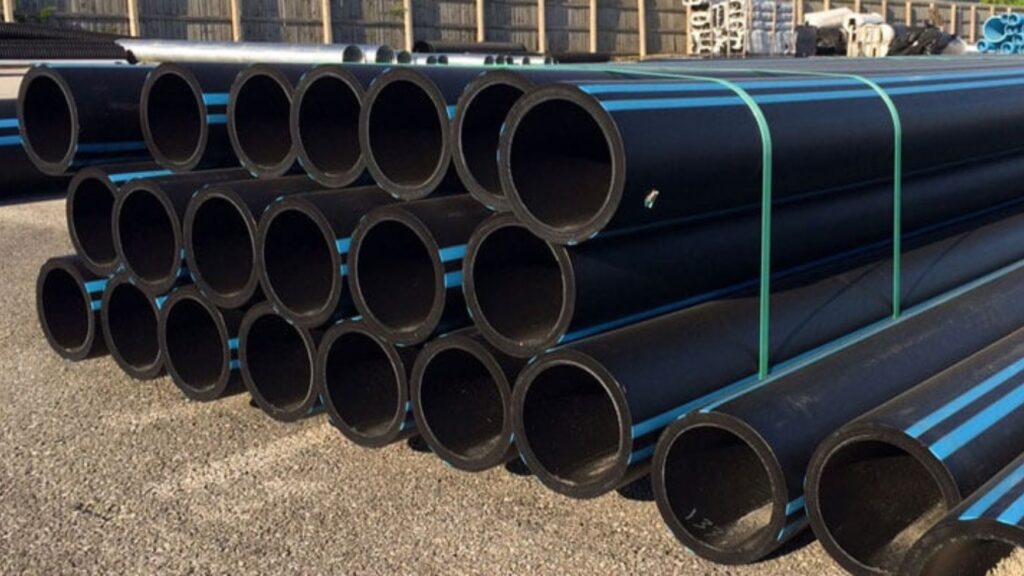Why High-Density Polyethylene pipes are Best for Today’s Infrastructure?
High-Density Polyethylene (HDPE) pipes are increasingly sought after by different industries because they can work extremely well, be multi-functional, and live long. HDPE pipes can be utilized in anything from water supply systems to sewage, and their advantages over regular pipes are immense. This guide takes into account the distinct strengths of HDPE pipes and why they are the perfect option for new infrastructure solutions. Quality is New Tech’s most significant concern, and HDPE pipes are a vital component in providing good and efficient systems for our customers. Why HDPE Pipes Stand Out
High-Density Polyethylene or HDPE is a petroleum-based thermoplastic polymer. HDPE is highly acclaimed for its extremely high strength-to-density ratio and hence is highly appropriate for use as a piping system material. HDPE is unlike common metals or ceramics in that its properties are significantly optimized to produce a better overall performance for each application.
1. Corrosion Resistance to Increase Lifespan:
One of the strongest reasons for the use of HDPE pipes is that they are resistant to corrosion. While corroding metal pipes with time, HDPE pipes are resistant to corrosion in aggressive soil conditions, chemical contact, or water contact. This implies that they have longer durations, sometimes up to 100 years or more with little maintenance. This is a wonderful benefit, particularly in regions with high humidity or aggressive soils.
Why is corrosion resistance necessary? Corrosion causes leaks, reduced quality water, and increased maintenance costs. Investing in HDPE pipes will reduce the risk significantly and ensure uninterrupted service.
2. Flexible and Long-Lasting: Ideal for Challenging Installations:
HDPE pipes are highly flexible, and as a result, they are the ideal choice for use in applications that need to be flexible, like in developing ground or where directional drilling is an imperative. Since HDPE can bend, it can absorb stress and alter form with the environment without cracking up or breaking down. It also makes installation simpler and less expensive with lower labor and material costs.
For uses such as underground facilities or telecommunications infrastructure, the strength of the pipe to bend and not fracture permits it to easily pass through restricted spaces and traverse obstacles. The strength also suits HDPE perfectly for horizontal direction drilling (HDD), wherein conventional rigid pipe is impracticable.
3. Lower Maintenance and Lower Leakage:
Leaks are one of the widespread problems for conventional pipe systems, especially at joints and in fittings. HDPE pipes in most scenarios can be joint-less, and in the event of those that do have one, welded ones can be used to create a monolithic system that will never leak. This type of capacity to create temporary, welded unions eliminates the water loss in addition to lowering the maintenance fee.
Once installed, HDPE pipes are usually welded along the seams so that there are no vulnerabilities for water or any other liquid to leak. This greatly minimizes the need for constant repair and replacement, with the system still in service with minimal maintenance.
4. Environmental Friendliness: A Sustainable Choice:
Another significant advantage of HDPE pipes is their environmental impact. Unlike many traditional materials, HDPE is fully recyclable. It can be repurposed into new products, helping reduce waste and promoting the circular economy. As a thermoplastic, HDPE can be melted down and reshaped without compromising its structural integrity, which makes it an excellent option for those looking to adopt more sustainable practices.
Additionally, HDPE pipes never pollute the environment by leaching chemicals, with the ecosystems around them remaining in their natural state. This renders HDPE the best choice for application in projects such as drinking water schemes or farm irrigation, where environmental health must be preserved by all means.
5. Chemical Resistance for Enhanced Durability:
HDPE pipes have good resistance to most chemicals, acids, alkalis, and salts. This is suitable for such applications as chemical processing, gas and oil, and sewage treatment, where pipe integrity should be preserved even when exposed to chemicals. Unlike regular pipes, HDPE cannot corrode in the event of chemical exposure, thereby making the system dependable in the long term.
HDPE’s resistance to harsh chemical environments through its chemical resistance renders it the choice of most industries. Its high resistance makes it an economic option for long-term applications, where repeated repairs or replacement would be too costly.
6. Lightweight and Easy to Handle:
HDPE pipe is also much lighter than metal pipe, which is easy to transport and install at lower expense and with less inconvenience. Such lightness also means that installation does not have to involve the use of expensive and heavy equipment, again saving installation cost and time. This can save serious money on bigger projects.
So what does this do for your project? Greater efficiency and speed of installation means your system will be operational sooner, keeping downtime and disruption to a minimum.
7. Cost-Efficiency Over Time:
Although the initial investment in HDPE pipe is higher than conventional material, the overall cost advantage several times greater. The strength, less maintenance, and durability of HDPE pipes translate into low operating costs over a long period. The minimal requirement for maintenance and fewer instances of leakage and, above all, the potential to withstand unfriendly conditions qualify HDPE pipes as a cost-effective investment.
For municipalities and industries that wish to maximize their return on their budgets and lower their long-term maintenance costs, HDPE is the natural choice.
8. Multifaceted Versatility:
HDPE pipes are applicable in any type of applications, ranging from sewerage and water supply to gas pipes, telephone networks, as well as stormwater drainage systems. They can be applied for applications in a number of different industries and, as such, serve as an end-to-end solution for all types of piping requirements.
No matter whether for industrial, commercial, or residential use, HDPE pipes are able to be engineered to meet a predetermined level of performance, ensuring a safe and effective system.
Frequently Asked Questions Regarding HDPE Pipes:
1. How long do HDPE pipes last?
HDPE pipes are extremely resilient and can last 50 to 100 years depending on specific applications and circumstances. Stress and corrosion resistance ensures a prolonged working age with minimal replacement needs.
2. Are HDPE pipes recyclable?
HDPE pipes are entirely recyclable. They can be melted and molded to be recycled for use in new products, and thus are an environmentally friendly option for sustainable use in infrastructure.
3. In what ways are HDPE pipes different from metal pipes?
HDPE pipes have several advantages over metal pipes, such as resistance to chemicals and corrosion, flexibility, and ease of maintenance. Metal pipes corrode and rust more easily, whereas HDPE pipes remain resistant to extreme environmental conditions.
At New Tech, we believe in the use of high-grade, long-lasting materials for infrastructural development. HDPE pipes are a categoric cost-savings leader in terms of environmental sustainability. Whatever your plan is for a water supply system, a sewerage treatment facility, or an industrial line, HDPE pipes offer unbeatable advantages that will keep paying for decades to come.


